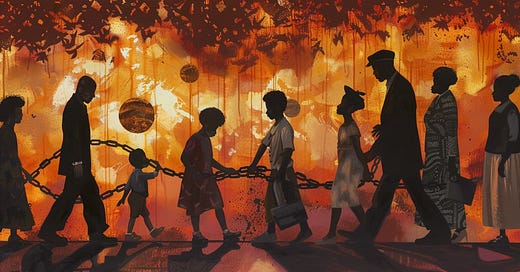What is truly holding back Black communities in America and Africa?
Is it merely the lingering effects of slavery and colonialism, or are we overlooking larger, more impactful factors?
It’s crucial to tear off the band-aid and move past the comfort of victimhood narratives to explore more profound truths.
In America, the legacy of slavery is a stark reality, just as the division of Africa by colonial powers marks a significant historical fact.
However, the idea that history is destiny needs to be challenged. While these historical events cast long shadows, focusing solely on them can obscure the opportunities available today. The insistence on seeing only these shadows can blind us to the possibilities for progress and achievement in the present.
The narrative that attributes all the problems within Black communities to past oppression has turned into a convenient scapegoat.
This perspective promotes a dependency culture and sets low expectations, sidelining the harder paths of self-reliance and community leadership. Critics like Thomas Sowell have long argued that this victim mentality traps individuals in a cycle of dependency, which limits their potential and undermines their capacity to achieve success.
The debate around current anti-racism theories adds another layer of complexity. The theories put forth by scholars like Ibram X. Kendi and Robin DiAngelo have been embraced with almost religious fervor, suggesting that racism lurks in every corner.
While these ideas aim to combat racial injustices, they often end up stoking division and racializing every issue, potentially holding back the very communities they aim to uplift. On the other hand, thinkers like Coleman Hughes advocate for focusing on socioeconomic class rather than race, arguing that this approach could lead to more practical and unifying solutions. Advocating for policies that are colorblind does not mean ignoring the realities of race; it means prioritizing broader economic opportunities that can catalyze real change.
In America, individuals like Ian Rowe and Glenn Loury are not just theorists but activists, promoting education and moral values that support real independence and success. Their advocacy for school choice highlights it as more than a policy—it's seen as a movement liberating Black children from failing schools, offering them a pathway to success.
In Africa, countries like Rwanda and Botswana are not just survivors of their past; they are examples of what can be achieved when leaders reject the victim narrative and seize control through innovation and good governance.
The role of media and education in shaping perceptions is significant.
Mainstream media often prefers stories of oppression and rarely highlights Black successes that do not fit their usual narrative. True educational reform means moving beyond indoctrination and allowing families the freedom to choose educational paths that teach children how to think critically, rather than what to think.
Ultimately, we have a choice: we can dwell on past injustices, or we can embrace a future of empowerment and success.
The chains of historical injustices are not as constraining today as they are often portrayed. Recognizing this can liberate us from the false belief that we are bound by them, and help us move forward with confidence and determination toward a brighter, more equitable future.
It’s the only way.





This piece pulls me in both ways, as an African second gen in the US. While I agree, at the surface level, with the point you’re working towards, I see similar talking points employed by people who do not think race impacts the American experience in any meaningful way (I’m new to your work but assume that’s not the point).
My concern for this is likely the same as yours — how do we make sure we’re solving the right problems? I’ve seen significant research showing that race impacts health, career, financial, etc outcomes even after controlling for socioeconomic status.
Is the argument here that this is false? How can we be sure, so that we know we’re solving the right problems?
I am totally with you here. When it comes to progressing and thriving as a peoples, we truly are our own worst enemies. We have so much else of more importance and consequence that we need to dedicate our attention and human resources to.
I recently penned a piece talking about this exact same topic:
Part IV: The African revolution will not be streamed: https://open.substack.com/pub/usafss/p/the-black-mans-burden-the-diasporas-f6b?r=70qq6&utm_campaign=post&utm_medium=web
I want us to bring light to the fact that we're fighting a war of narratives right now. Once we're able to articulate a fresh, comprehensive and cohesive vision for black people the world over, things will turn around. What's the story? What's the path forward?